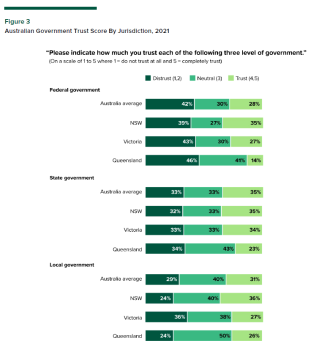
More Australians trust local and state governments than the federal government, a new report indicates.

Research and advisory firm Forrester surveyed 500 Australians during Australia’s second Covid-19 wave, between July and October 2021, as part of its Future Of Work Survey.
It found that, on average, only 28 per cent of Australians trust the federal government, compared to the average of 35 per cent who trust state governments and 31 per cent who trust their local leaders.
“Despite increases in trust at the beginning of the pandemic, issues like supply shortages and inconsistent medical advice on vaccines…resulted in more than 40 per cent of Australians distrusting the federal government,” the report said.
Forrester’s trust model for government measures how well people’s trust in government drives behaviours such as compliance, advocacy, and engagement.
Sam Higgins, Principal analyst at Forrester, says ‘trust is fragile’.
“Government leaders cannot rely on opinion polls or the electoral fortunes of political parties or candidates alone to drive compliance, advocacy, and engagement,” he said in a statement.
“With the election result bringing in a new wave of change, this is the perfect opportunity for the Australian government to assess current trust levels and uncover gaps, identify blind spots, and prioritise actions that will build unbreakable bonds with the people they serve.”

NSW most trusting
NSW residents were found to have the highest overall trust in government, with a trust score of 54.9 out of 100, which is four points above the national average.
Following behind the national average was Queensland with a score of 48.2 and Victoria with a score of 47.7.
Trust in government increases with education and income, according to the survey results, with people with a higher education having a trust score of 54.2.
People with a ‘medium’ education, which includes Years 11 and 12, a certificate or diploma, gave a score of 47.2 and those with a low education (early childhood, primary school or junior high) gave a score of 41.7.
“Higher education promotes individual social trust because it plays a key role in expanding people’s views of economic and social change and inspiring consensus toward institutions,” the report said.
High income earners also had the highest trust in the government with a score of 56.4m which was higher than the national average of 50.8.
Medium income earners had a score of 49.1 and low income earners had a score of 47.9.
Driving trust
The report outlines four key drivers of trust in government, including accountability, skilled public servants, transparency and making people feel safe.
“Accountability is the most important lever of trust. The best way for government institutions to win people’s trust is to fulfill their promises. This is an area where government organisations must improve,” the report says.
“Research indicates that in Australia and other Western democracies, governments keep most of the promises they make.
“Governments must reduce the dissonance between this perception and reality, such as by focusing on the promises that people care about the most and those that generate the strongest political discourse and media coverage.”
The next most important driver of trust is the ability of public servants to demonstrate competence and expertise.
“Just 36 per cent of respondents to our survey believe that public servants are professional and capable at what they do,” the report said.
“Government must systematically identify, hire, nurture, and retain top talent.”
Comment below to have your say on this story.
If you have a news story or tip-off, get in touch at editorial@governmentnews.com.au.
Sign up to the Government News newsletter
State, local govt more trusted than federal - Government News
Read More
No comments:
Post a Comment